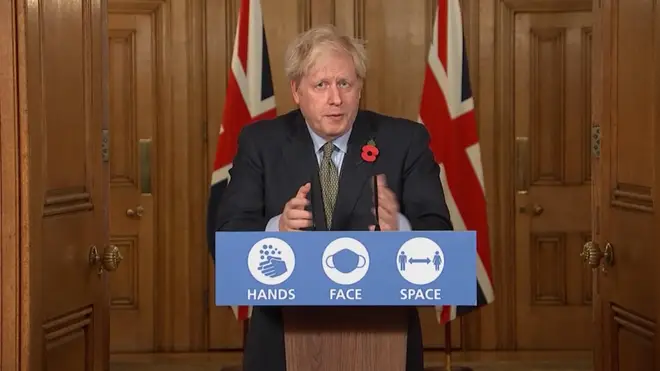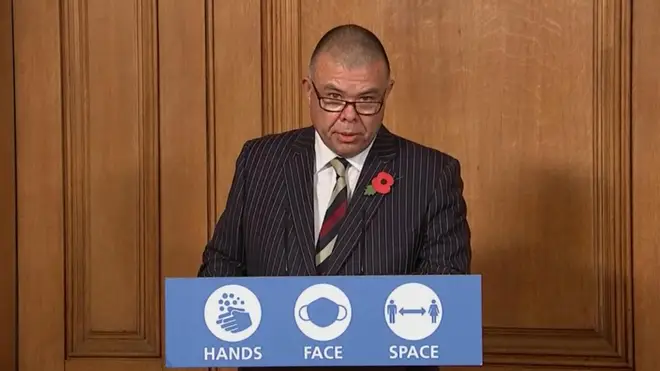
Ali Miraj 1pm - 4pm
9 November 2020, 17:23 | Updated: 9 November 2020, 17:52

Boris Johnson has said that mass Covid-19 testing and vaccine progress are 'no substitute' for national restrictions as he urged the public to keep following lockdown guidelines.
Speaking at a Downing Street press conference, the Prime Minister said: "While we're making progress, this mass testing project is still in its infancy.
"Both mass testing nor progress on vaccines, though both vital arrows in our epidemiological quiver and key parts of the fight against Covid, at the present time are no substitute for the national restrictions, social distancing, hand hygiene and all the rest."
His comments come amid the revelation from pharmaceutical firm Pfizer that the Covid-19 vaccine they are working on is 90% effective at stopping people catching the disease.
Speaking about the news of the Pfizer coronavirus vaccine, Mr Johnson said: "We absolutely cannot rely on this news as a solution and the biggest mistake we could make now is to soften our resolve".
Mr Johnson went on to say we can't "slack" on the Coronavirus rules despite the major breakthrough.
"I must stress the test are very, very early days," he commented.
"We absolutely cannot rely on this news as a solution, and the biggest mistake we could make now is to soften our resolve."

Johnson discusses vaccine breakthrough
Boris Johnson said the Pfizer vaccine news was a sign the "scientific cavalry" was on its way, but stressed the need for caution.
The Prime Minister said the vaccine had cleared a "significant hurdle" but there were more to cross before it could be used.
"I must stress that these are very, very early days," he said during a Downing Street press conference.
Mr Johnson said he had talked about the "distant bugle of the scientific cavalry coming over the brow of the hill" with a breakthrough.
"I can tell you that tonight that toot of the bugle is louder, but it's still some way off, we absolutely cannot rely on this news as a solution," he said.
"The biggest mistake we could make now would be to slacken our resolve at a critical moment."

His comments come as England continues to face tough lockdown restrictions across the country, which are in place until December 2.
Speaking about the lockdown, Boris Johnson acknowledged the measures had a "big impact" on people's mental health.
He told the press conference: "It's the loneliness, I think. The sense of not being able to see other people that's been caused by some of the lockdown measures, alas, all sorts of anxieties that people are prone to and have been prone to."
Mr Johnson said funding had been allocated to mental health services but "the best thing we can do is bring the crisis to an end as fast as we can, follow the guidance, get through the current period to December 2 and then allow things to get better, as I'm sure I'm sure they will".
England's deputy chief medical officer Jonathan Van-Tam said there was an "enormous mental health burden".
As well as mental health problems, there was a wider issue of people feeling "really rubbish about where we are now".
"Our lives have changed, we can't do the things that we normally do as human beings, we can't interact in the way that we want to.
"We don't have the nice things, like sport on a Saturday afternoon at a stadium and so forth. It is really tough from that perspective."
He urged people to follow lockdown rules "to the letter" to give them the best chance of having an effect.

How might Covid-19 vaccines work in practice?
However, Wales' 17-day 'firebreak' lockdown ended today, with First Minister Mark Drakeford saying there are "early positive signs" that it curbed the spread of coronavirus in the country.
Mr Drakeford said recent high numbers of new cases were beginning to drop as Wales began life under new national measures from Monday.
The end of the 17-day lockdown means groups of up to four people can now meet up in cafes, pubs and restaurants while shops, gyms, hairdressers and places of worship can also reopen.
Supermarkets can again sell non-essential items while people will only be allowed to meet up inside homes with members of one other household if they have joined into a "bubble".